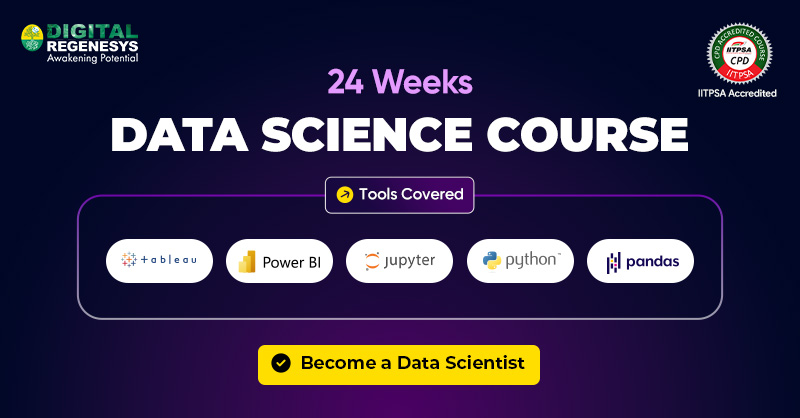How to do Data Management using MySQL?

Data Management using MySQL is vital for professionals entering or advancing in Data Science. MySQL enables efficient handling of structured datasets, supports data-driven decisions, and integrates with tools such as Python and Tableau. Building on Excel knowledge, professionals can use MySQL to manage large-scale data for business intelligence, finance, and analytics. By mastering both Excel and MySQL, learners develop a competitive advantage in today’s digital economy.
In this article, we will examine the role of MySQL in data management, its connection to data science, and the transition from Excel to SQL for developing career-ready skills.
Why Data Management Matters in Data Science
Data Science depends on datasets that are accurate, consistent, and secure. When data is poorly managed, the results can be misleading, leading to weak analysis, unreliable predictions, and poor business choices. Whether working with structured records, such as financial statements, or unstructured sources, including customer feedback and social media, proper data management safeguards the quality and credibility of the information.
Strong data practices enable professionals to-
- Ensure reliability through accurate and consistent records.
- Support scalability by managing growing datasets efficiently.
- Strengthen decision-making by providing trustworthy insights.
With the rising demand for digital capabilities, organisations are seeking professionals skilled in database management. Developing expertise in MySQL helps professionals stay competitive in a world where data-driven strategies drive success.
Read more on How to Start Learning Data Science?- Check the Important Steps! here

MySQL in the Context of Data Science
MySQL is one of the most widely adopted open-source relational database systems, trusted by organisations worldwide. It utilises Structured Query Language (SQL) to manage and query datasets, making it a core tool for professionals working with structured information.
With features such as indexing, relational mapping, and the ability to handle complex queries, MySQL provides both scalability and efficiency for business and scientific applications.
In the field of Data Science, MySQL plays a critical role by enabling-
- Data cleaning and preprocessing- Transforming raw data into usable formats.
- Large-scale storage- Managing vast datasets without compromising speed.
- Integration with analytics- Feeding structured data into pipelines for statistical modelling and machine learning.
Read more on How to Learn Data Science | A Beginner’s Guide here
From Excel to MySQL- A Professional Learning Path
Excel is often the first tool professionals use when working with data. Its user-friendly interface and widespread adoption across industries make it a natural entry point into Data Science. Yet, as datasets grow larger and queries become more complex, Excel begins to show its limits. This is where MySQL proves its value, offering greater scalability, speed, and precision.
Moving from Excel to MySQL allows professionals to expand their capabilities while building on familiar skills-
- Excel functions vs. SQL queries- Both are used for filtering and summarising data, but SQL can process far larger datasets with greater efficiency.
- Pivot tables vs. GROUP BY- MySQL provides advanced grouping and aggregation, extending analysis beyond Excel’s reach.
- VLOOKUP vs. JOINs- MySQL’s JOIN operations enable the seamless integration of multiple datasets with greater flexibility than Excel.
Read more on Is Data Science a Good Career? here
Practical Applications of MySQL in Data Management
MySQL is widely used in professional environments where storing, retrieving, and analysing data is critical. Its versatility makes it suitable for a variety of business functions, supporting better decisions and streamlined operations. Some practical applications include-
- Business Intelligence- Centralising sales and operational data to build dashboards and track performance.
- Finance- Managing large volumes of financial data for risk modelling, forecasting, and trend analysis.
- Market Research- Storing and querying consumer information to uncover behavioural patterns and generate insights.
- HR Analytics- Monitoring employee performance, managing workforce data, and analysing attrition trends.
Integrating MySQL with Data Science Tools
MySQL is seldom used on its own. Within Data Science workflows, it integrates effortlessly with other technologies, strengthening analysis, visualisation, and predictive modelling. This interoperability makes it a practical choice for professionals who work across diverse tools and platforms.
- Python Integration- MySQL can be connected with Python through libraries such as Pandas and SQLAlchemy, enabling advanced statistical analysis, automation, and data manipulation.
- Visualisation Tools- Linking MySQL with platforms like Tableau and Power BI enables businesses to transform raw data into actionable dashboards and visual stories that support informed decision-making.
- Machine Learning Pipelines- MySQL serves as a reliable storage layer, ensuring structured datasets are ready for machine learning algorithms and large-scale big data projects.
By serving as the foundation of these integrated systems, MySQL provides both stability and flexibility, enabling professionals to build end-to-end solutions in Data Science.
Read more on Exploring Data Science Jobs in South Africa- Roles, Salaries, Demand & Career Pathways here
Why Professionals Should Master MySQL
MySQL equips professionals to manage large-scale, enterprise-level data efficiently. Mastering MySQL enables working with structured databases, running complex queries, and extracting actionable insights to drive business decisions.
Key advantages of mastering MySQL include-
- Developing advanced data management skills for large datasets.
- Strengthening career prospects in data-driven roles across industries.
- Bridging foundational data knowledge with more technical, database-focused capabilities.
- Increasing adaptability in roles that require both business understanding and technical expertise.
Digital Regenesys supports professionals in mastering these skills through our Certification Course in Data Science, where learners gain exposure to MySQL and other Data Science tools, ensuring they remain industry-ready.
Conclusion
Data management forms the backbone of modern Data Science, and MySQL provides the structure, scalability, and reliability required to handle complex datasets. While Excel equips professionals with fundamental data-handling skills, MySQL extends these capabilities to enterprise-level analysis and integration with advanced Data Science tools. Together, they create a solid foundation for careers in analytics, business intelligence, finance, and research.
At Digital Regenesys, our Data Science Certification Course equips learners with hands-on experience in MySQL, Excel, and other cutting-edge tools. By enrolling, you’ll gain career-ready expertise to thrive in today’s competitive digital economy.
Take the next step in your Data Science journey with Digital Regenesys. Enrol today to understand the full potential of data management with MySQL.
Last Updated: 1 October 2025
